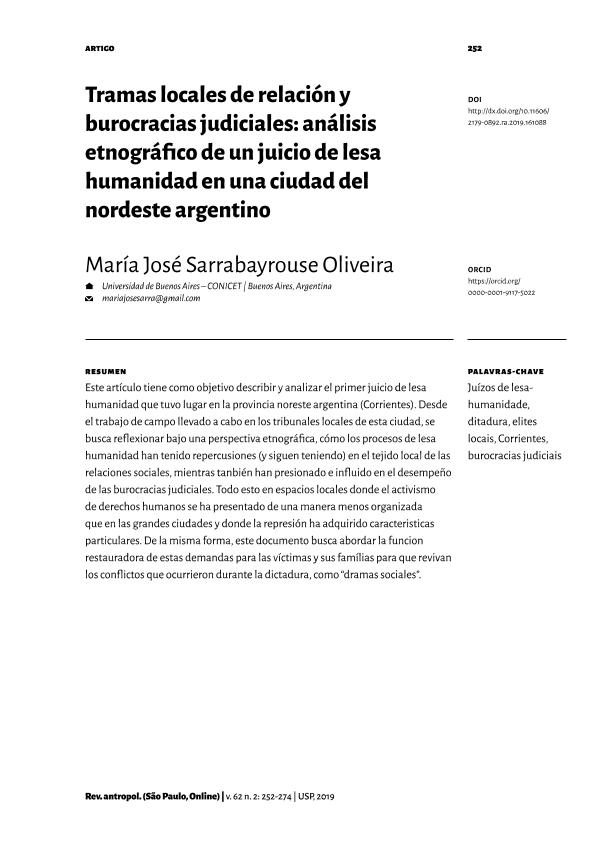Mostrar el registro sencillo del ítem
dc.contributor.author
Sarrabayrouse Oliveira, Maria Jose

dc.date.available
2021-07-30T15:51:24Z
dc.date.issued
2019-08-15
dc.identifier.citation
Sarrabayrouse Oliveira, Maria Jose; Tramas locales de relación y burocracias judiciales: Análisis etnográfico de un juicio de lesa humanidad en una ciudad del nordeste argentino; Universidade de Sao Paulo; Revista de Antropologia; 62; 2; 15-8-2019; 252-274
dc.identifier.issn
0034-7701
dc.identifier.uri
http://hdl.handle.net/11336/137457
dc.description.abstract
Este artículo tiene como objetivo describir y analizar el primer juicio de lesa humanidad que tuvo lugar en la provincia noreste argentina (Corrientes). Desde el trabajo de campo llevado a cabo en los tribunales locales de esta ciudad, se busca reflexionar bajo una perspectiva etnográfica, cómo los procesos de lesa humanidad han tenido repercusiones (y siguen teniendo) en el tejido local de las relaciones sociales, mientras tanbién han presionado e influido en el desempeño de las burocracias judiciales. Todo esto en espacios locales donde el activismo de derechos humanos se ha presentado de una manera menos organizada que en las grandes ciudades y donde la represión ha adquirido caracteristicas particulares. De la misma forma, este documento busca abordar la funcion restauradora de estas demandas para las víctimas y sus famílias para que revivan los conflictos que ocurrieron durante la dictadura, como “dramas sociales”.
dc.description.abstract
The objective of this article is the description and analysis of the first crime of lese-humanity carried out in a province in northeastern Argentina (Corrientes). Based on the field job, carried out in the courts of this town, we seek to reflect from an ethnographic perspective on the way in which the processes of humanity have affected (and have an impact) on the local fabric of social relations, while it has also constrained and influenced the performance of judicial bureaucracies. Those situations were occurred in social spaces where the activism of Human Rights was presented in a less organized way than in large cities and where repression acquired particular characteristics. In this way, this work seeks to attend to the restorative function of these judicial processes for the victims and their families and in the revival of the conflicts that occurred during the dictatorship, in their capacity as “social dramas”.
dc.format
application/pdf
dc.language.iso
spa
dc.publisher
Universidade de Sao Paulo

dc.rights
info:eu-repo/semantics/openAccess
dc.rights.uri
https://creativecommons.org/licenses/by/2.5/ar/
dc.subject
Jueces de humanidad
dc.subject
Dictadura
dc.subject
Élites locales
dc.subject
Corrientes
dc.subject
Burocracias judiciales
dc.subject.classification
Otras Humanidades

dc.subject.classification
Otras Humanidades

dc.subject.classification
HUMANIDADES

dc.title
Tramas locales de relación y burocracias judiciales: Análisis etnográfico de un juicio de lesa humanidad en una ciudad del nordeste argentino
dc.title
Local networks and judicial bureaucracies: Ethnographic analysis of a trial against humanity in a city in northeastern Argentina
dc.type
info:eu-repo/semantics/article
dc.type
info:ar-repo/semantics/artículo
dc.type
info:eu-repo/semantics/publishedVersion
dc.date.updated
2021-07-29T18:37:39Z
dc.journal.volume
62
dc.journal.number
2
dc.journal.pagination
252-274
dc.journal.pais
Brasil

dc.journal.ciudad
São Paulo
dc.description.fil
Fil: Sarrabayrouse Oliveira, Maria Jose. Universidad de Buenos Aires. Facultad de Filosofía y Letras. Instituto de Ciencias Antropológicas. Sección de Antropología Social; Argentina. Consejo Nacional de Investigaciones Científicas y Técnicas; Argentina
dc.journal.title
Revista de Antropologia

dc.relation.alternativeid
info:eu-repo/semantics/altIdentifier/doi/http://dx.doi.org/10.11606/2179-0892.ra.2019.161088
dc.relation.alternativeid
info:eu-repo/semantics/altIdentifier/url/https://www.revistas.usp.br/ra/article/view/161088
Archivos asociados
